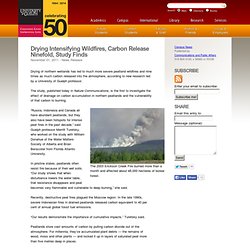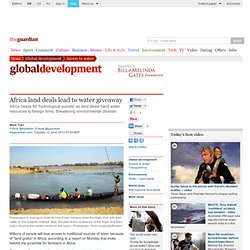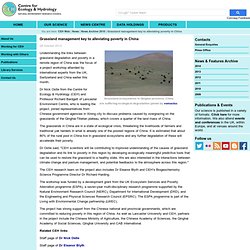

17102IIED. Drying Intensifying Wildfires, Carbon Release Ninefold, Study Finds. November 01, 2011 - News Release Drying of northern wetlands has led to much more severe peatland wildfires and nine times as much carbon released into the atmosphere, according to new research led by a University of Guelph professor.

The study, published today in Nature Communications, is the first to investigate the effect of drainage on carbon accumulation in northern peatlands and the vulnerability of that carbon to burning. The 2003 Erickson Creek Fire burned more than a month and affected about 48,000 hectares of boreal forest. “Russia, Indonesia and Canada all have abundant peatlands, but they also have been hotspots for intense peat fires in the past decade,” said Guelph professor Merritt Turetsky, who worked on the study with William Donahue of the Water Matters Society of Alberta and Brian Benscoter from Florida Atlantic University.
In pristine states, peatlands often resist fire because of their wet soils. Recently, destructive peat fires plagued the Moscow region. Contacts: ‘Film farming’ uses no soil and just one-tenth the water. Gain instant and exclusive access to over 5,000 of the most creative ideas, innovations and startups on our database and use our smart filters to take you direct to those that are most relevant to your industry and your needs.

Not interested? Farms Without Soil Take Root In The Middle East. We insist on living on parts of the earth covered by desert, rock, or ice.

Because those places don’t produce their own food, feeding the people who live there requires a global network of food production and transport. For desert nations such as the Gulf States, where as much as 90% of food is imported, this is a precarious situation, and can easily lead to shortages. When that happens, and food prices skyrocket like they did between 2005 and 2008, it can lead to unrest. Now those countries are looking to feed themselves. One strategy has been to buy up vast tracts of land in Asia and Africa to grow and export food. Redeploying a technology designed for medical applications, Japanese researcher Yuichi Mori at Waseda University is using a plastic "hydrogel" membrane resembling Saran Wrap to grow plants on a transparent, soil-free film.
Early tests in desert greenhouses in the Middle East show tomatoes and other plants thriving on the membrane directly atop the desert sand. Sustainable Development - FAQ: Landscapes. Africa land deals lead to water giveaway. Passengers in a pirogue observe how Fulani herders cross the Niger river with their cattle on the outskirts of Mopti, Mali.

Situated at the confluence of the Niger and Bani rivers, Mopti is the market centre for the region. Photograph: Florin Iorganda/Reuters Millions of people will lose access to traditional sources of water because of "land grabs" in Africa, according to a report on Monday that looks behind the scramble for farmland in Africa. The report: Squeezing Africa dry: behind every land grab is a water grab, shows how land deals, covering millions of acres of fertile land, also pose a threat to Africa's fresh water systems.
"If these land grabs are allowed to continue, Africa is heading for a hydrological suicide," said Henk Hobbelink, co-ordinator of Grain, a group that backs small farmers. Land Matrix. Land Matrix partnership launches second phase of its Global Observatory on large scale land acquisitions Dynamic public interface promotes greater transparency in land investments Bern/Hamburg/Montpellier/Rome (10 June 2013) The Land Matrix partnership today launches the second phase of the Global Observatory on large scale land acquisitions.

The Land Matrix Global Observatory is a tool that promotes transparency in land transactions and supports open data and open source communities focused on land deals. The thoroughly updated dataset allows tracking of large scale land acquisitions, from negotiation to implementation. 279na6. Grassland management key to alleviating poverty in China. 28 October 2010 Grassland ecosystems in Qinghai province, China are suffering ecological degradation (photo by vomacka) Understanding the links between grassland degradation and poverty in a remote region of China was the focus of a project workshop attended by international experts from the UK, Switzerland and China earlier this month.

Dr Nick Ostle from the Centre for Ecology & Hydrology (CEH) and Professor Richard Bardgett of Lancaster Environment Centre, who is leading the project, joined representatives from Chinese government agencies in Xining city to discuss problems caused by overgrazing on the grasslands of the Qinghai-Tibetan plateau, which covers a quarter of the land mass of China. Osborne made 'unjustified attack' on EU habitat rules. 22 March 2012Last updated at 13:11 ET The review said more guidance was needed around the siting of offshore wind farms George Osborne has been accused of an "unjustified attack" on EU rules to protect wildlife after a Defra review found they were mostly "working well".

Last year, the chancellor suggested they were placing "ridiculous costs" on British firms wanting to develop. But Defra said that while there were delays in some planning applications, "the Habitats and Wild Birds Directives may only be one contributory factor". Environmental groups said Mr Osborne's comments had "no factual basis". The Habitats and Wild Birds Directives are designed to protect Europe's most threatened areas and species. 'Fewer than 0.5%'